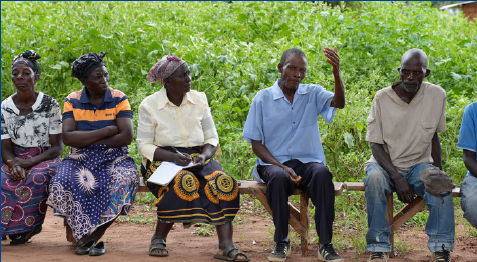
Embracing Tradition: Empowering Positive Change through Indigenous Knowledge to Tackle Climate Challenges in Nyimba District
FAO/Tiwine Muchipa, 2025
17/03/2025
In the village of Sichibende, located in Nyimba District, Eastern Province, Zambia, the effects of climate change are becoming increasingly evident, disrupting both the environment and the people who depend on it. “The change of mindset from harmful practices to more sustainable, climate-friendly actions is exactly what our community needs,” says Shadrack Daka, leader of the Sichibende Information Centre, a local volunteer group. This statement highlights the growing realization that modern, climate-resilient farming practices cannot come at the expense of cultural heritage or the environment. Reconnecting with traditional wisdom while incorporating modern solutions is vital for both ecological and food security. Unsustainable farming methods have contributed to the loss of indigenous tree species and wild fruits that were once essential to the local diet. Local elder Nelson Banda explains, “The indiscriminate cutting of trees has devastated the availability of wild fruits that were once a staple of our diet and part of our rich biodiversity.”
These fruits, now scarce, have not only diminished food options but also disrupted ecosystems that depend on these species. The disappearance of indigenous foods is not just an environmental issue but a cultural one. Elders express deep concern over the erosion of traditional knowledge and the loss of practices that once made the village resilient to climate shifts. This knowledge, passed down through generations, was integral to the village’s sustainable practices. However, as more "modern" farming techniques and crops take root, much of this invaluable wisdom is at risk of being forgotten. One personal story that illustrates this shift comes from Mary Daka, a local woman who shared how climate change has impacted her family’s food security. With diminishing harvests, her family now struggles to survive, often eating only one meal per day.
The inability to grow enough food to last until the next planting season forces them to ration heir already limited supplies. Mary’s experience highlight show climate change is not just an environmental crisis but a deeply human issue that affects livelihoods and well-being.
The Facility for Action for Climate Empowerment to Achieve Nationally Determined Contributions FACE-NDC project, funded by the German Federal Ministry of Economic Affairs and Climate Action, is spearheading efforts to address this crisis. The FACE-NDC initiative, led by the Food and Agriculture Organization (FAO) of the United Nations in collaboration with United Nations Education, Science, and Culture Organization (UNESCO), United Nations Institute for Training and Research (UNITAR), the University of Zambia(UNZA), and the and the Copperbelt University (CBU)facilitates community dialogues, encouraging the blending of traditional knowledge with modern solutions to build resilience.
By integrating behavioural science, FACE-NDC helps communities understand how people make climate- importance on cultural and local knowledge in developing effective adaptation strategies. The initiative brings together farmers, youth, women, and elders to explore how best to adapt to climate change while preserving the environment and cultural heritage. By focusing on decision-making processes, FACE-NDC helps communities like Sichibende strengthen their resilience and reclaim their future. Nelson Banda’s reflections on deforestation and the loss of indigenous species illustrate the intergenerational consequences of harmful practices. Without urgent action, future generations will lack the knowledge and resources needed to navigate an increasingly uncertain climate.
As the villagers come together to discuss sustainable solutions, the road to climate resilience in Sichibende requires a shift in mindset one that values both modern science and ancestral wisdom. By addressing harmful practices head-on and embracing climate-friendly behaviours, the community can rebuild resilience and ensure a better future for both the environment and future generations. This transformation, taking root in Sichibende, offers valuable lessons for other communities in Zambia and beyond, demonstrating the power of blending old and new knowledge in confronting climate change.
